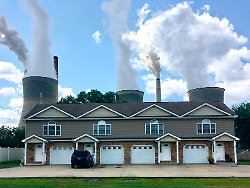Monday, November 1st, 2021
“Could Destroy the Planet”
Supreme Court interferes in climate protection
From Roland Peters
When it comes to air pollution, the US Environmental Protection Agency (EPA) is responsible. At the request of Republican states and the coal industry, the Supreme Court is now examining whether this does not mean too much power. Climate protectors are sounding the alarm.
What can the US Environmental Protection Agency (EPA) dictate to business? That is what the US Supreme Court will examine. A federal court had previously granted the EPA extensive powers. The coal industry and Republican-ruled states have appealed to the Supreme Court and are now being heard. Climate protectors fear the worst: That the Supreme Court of the Environmental Protection Agency will pull its teeth and that environmental protection will become even more a plaything of political interests than it is already, and thus also of powerful lobbyists of the fossil energy industry.
Several judge posts have been filled in recent years; They were nominated by ex-President Donald Trump. The Supreme Court has thus got a clear list; 6 out of 9 judges are considered conservative. Many Republicans see a historic opportunity for change in their favor. Abortion opponents in particular hope that the Supreme Court will overturn the previous precedent ruling of the Supreme Court. Abortions have been allowed in the United States since 1972. Judgments on gun law and religious freedom are also eagerly awaited.
So now the Supreme Court is also massively interfering in climate policy. West Virginia leads the total of 18 states before the Supreme Court against the competences of the EPA. West Virginia is the second largest coal-producing state in the United States after Wyoming. According to a recent study by the local university, 17 percent of the state’s economic output and 33,000 jobs are dependent on coal. A conversion to renewable energies would mean a new era for him.
“Dramatic Changes”
In their complaint, states and companies criticize that the federal court ruling allows the EPA to “set standards at the regional and even national level and force dramatic changes in how and where electricity is produced and also change every other economic sector.” This is exactly what the “Clean Air Act” provides, which the authority had for the first time granted basic competences in 1963.
The law requires the EPA to define “the best ways to reduce emissions” for polluters and then instruct states to act accordingly. When Barack Obama lost the majorities in both chambers of congress during his presidency, he wanted to initiate the energy transition through the EPA with the “Clean Power Plan” and gradually replace coal energy with renewables. The Supreme Court put the plan on hold, and Donald Trump replaced it with an industry-friendly rule on the last day of his presidency.
Basically, the plaintiffs want the authorities not to dictate anything to them in the future either and that everything has to be decided by Congress. “The Supreme Court could destroy the planet,” tweeted Democratic MP, appalled. “It’s like an earthquake for those who care about the climate,” Harvard University law professor Richard Lazarus told the New York Times: The court’s decision could significantly reduce the government’s ability to reduce greenhouse gas emissions from power plants in the country to limit. It would be an important building block through which the USA could achieve its climate protection goal: to halve emissions by 2030 compared to 2005.
Considerable resistance
On Thursday, Biden presented his plans to invest 555 billion dollars in climate protection programs, such as funding for electric cars and solar cells. The White House is convinced that this will cut emissions in half. The long-term plan followed on Sunday: the world’s second largest polluter should be climate-neutral by 2050. “Our investments and politics will fuel the economy, they will strengthen our society and improve the quality of life,” said the national climate advisor Gina McCarthy in the White House.
Will and words alone are not enough. In any case, critics doubt that the planned efforts will be sufficient. It is also unclear whether the President can even achieve the goal through parliamentary channels and thus through legislation. There is considerable resistance from business and from Congress. Biden can currently initiate measures such as the regulation of pollutant emissions from coal-fired power plants with the help of the environmental protection agency EPA. But it must be clarified whether she is allowed to do this at all. The Supreme Court now wants to decide.
The court ignored the urging of Biden’s government to stay out until the agency defined new rules. Its director Michael Regan said he was “very optimistic” that the EPA had the right to limit CO2 emissions from coal-fired power plants: “We will not be dissuaded from our task.” A ruling from the Supreme Court is expected in June.
